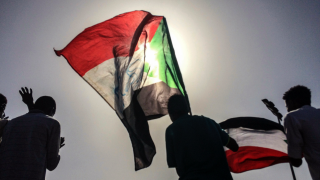The United States government and the government of Sudan have begun to make moves to rekindle their bilateral relationship after a 23-year break. This announcement was made recently by the United States(U.S) secretary of state, Mike Pompeo, during the Sudanese Prime Minister, Abdalla Hamdok’s visit to Washington. The two countries are currently making plans to commence the exchange of ambassadors.
“This decision is a meaningful step forward in strengthening the U.S-Sudan bilateral relationship, particularly as the civilian-led transitional government works to implement the vast reforms under the political agreement and constitutional declaration of August 17, 2019,” Pompeo said in a statement.
This renewed relationship between the two countries comes as a result of the transformational moves taken by Sudan after the ousting of its former leader, President Omar al-Bashir. In August and September 2019, the Transitional Military Council (TMC) formed a civilian transitional government. TMC formally transferred executive power to a mixed military-civilian collective head of state, the Sovereignty Council of Sudan, and appointed a civilian, Abdalla Hamdok, as Prime Minister.
The cabinet that was formed had civilians as most of its members, while judicial power was transferred to a woman, Nemat Abdullah Khair, Sudan’s first female Chief Justice.
Tweeting after the meeting in Washington, Sudan’s Prime Minister said that “after a 23-year interruption, it is great to see the start of the ambassadors’ exchange operation between Sudan and the United States of America.” He further added that it was “an important step towards rebuilding Sudan.”
The United States established diplomatic relations with Sudan in 1956, following its independence. Sudan later broke diplomatic relations with the United States in 1967 after the start of the Arab-Israeli War. Diplomatic relations were reestablished between the two in 1972. But in 1973, Palestinian terrorist group, the Black September, assassinated U.S. Ambassador Cleo A. Noel and Deputy Chief of Mission Curtis G. Moore in Khartoum. Sudanese officials arrested the terrorists and tried them on murder charges. However, in June 1974, they were released to the custody of the Egyptian Government. This made the U.S withdraw its ambassadors temporarily from Sudan.
In the 1990s, Sudan housed notorious terrorist leaders like Carlos the Jackal, Osama bin Laden, Abu Nidal, and other terrorist leaders in Khartoum. It also established links with international terrorist organizations resulting in the United States’ designation of Sudan as a “State Sponsor of Terrorism” in 1993.
When a country is listed by the U.S in this group of terrorist sponsors, the sanctions imposed on them by the U.S government include no arms-related exports from the U.S and its allies and restrictions on economic assistance. Also, financial restrictions: requiring the United States to oppose loans by the World Bank and other international financial institutions, diplomatic immunity waived to allow families of terrorist victims to file for civil damages in U.S. courts, authority to prohibit a U.S. citizen from engaging in financial transactions with the government on the list without a license from the U.S. government, and so much more.
A few months ago, the Sudanese Prime Minister had called on the World power to remove the sanctions that the country is heavily laden with. He explained that it was the former regime that sponsored terrorism while the people revolted against it. In his appeal, he said, “…we call on the United States to remove Sudan from the list of state sponsors of terrorism and to stop punishing the people of Sudan for crimes committed by the former regime.”
With this new bilateral relationship moves with the U.S comes the hope for Sudan to be removed from the U.S list of “State Sponsor of Terrorism.” Some of the benefits that can be derived from this alliance include military aid that Sudan’s army is likely to receive from the U.S and allies to combat terrorism which has had a strong base in the country; financial aid from the World Bank, the International Monetary Fund(IMF) and other international financial agencies to help combat food insecurity and balance its economy. This development is also likely to attract foreign investors.
By Ishioma Eni.








